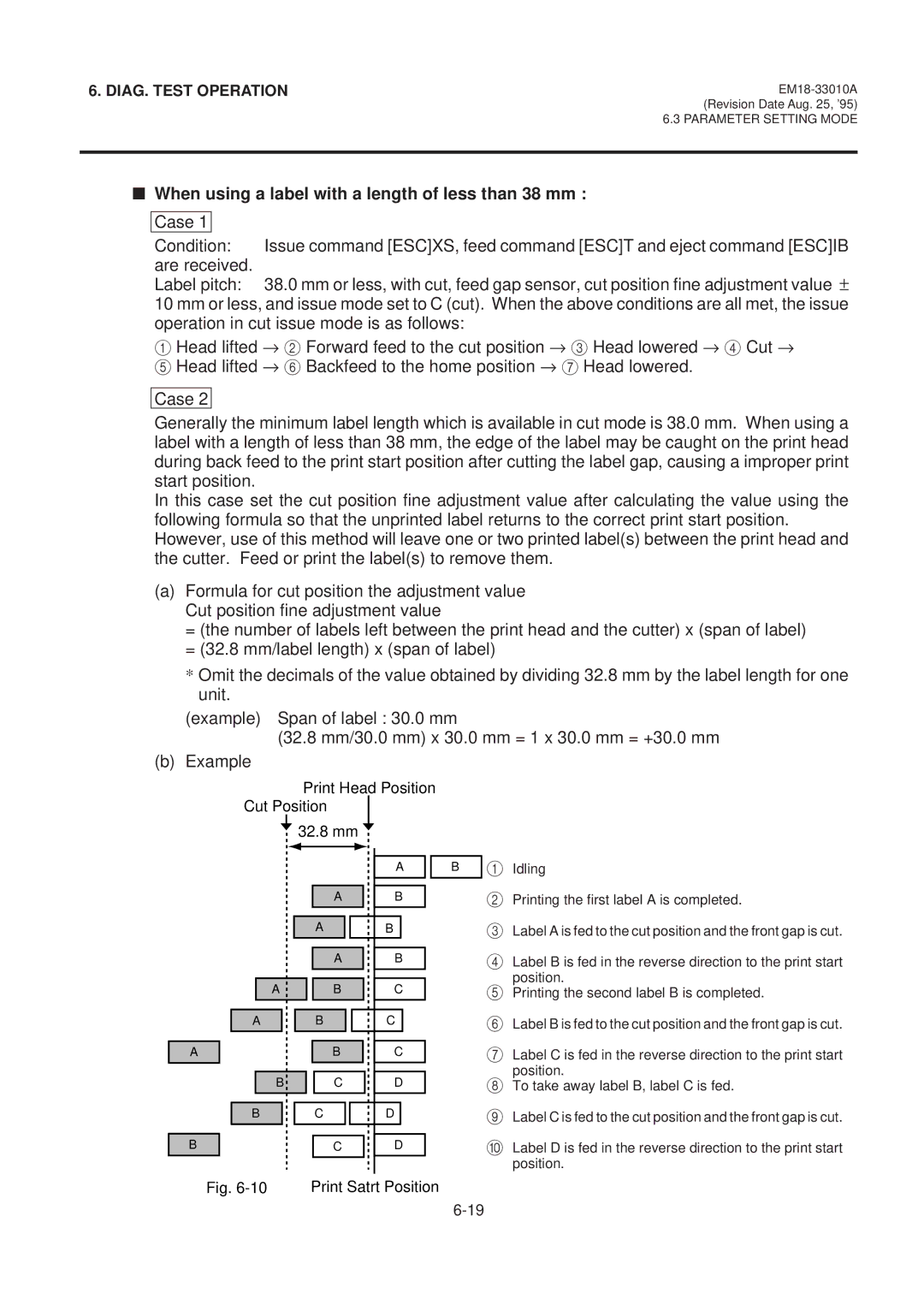
6. DIAG. TEST OPERATION
6.3 PARAMETER SETTING MODE
■When using a label with a length of less than 38 mm :
Case 1 |
|
|
Condition: | Issue command [ESC]XS, feed command [ESC]T and eject command [ESC]IB | |
are received. | 38.0 mm or less, with cut, feed gap sensor, cut position fine adjustment value ± | |
Label pitch: | ||
10 mm or less, and issue mode set to C (cut). When the above conditions are all met, the issue operation in cut issue mode is as follows:
1Head lifted → 2 Forward feed to the cut position → 3 Head lowered → 4 Cut →
5 Head lifted → 6 Backfeed to the home position → 7 Head lowered.
Case 2
Generally the minimum label length which is available in cut mode is 38.0 mm. When using a label with a length of less than 38 mm, the edge of the label may be caught on the print head during back feed to the print start position after cutting the label gap, causing a improper print start position.
In this case set the cut position fine adjustment value after calculating the value using the following formula so that the unprinted label returns to the correct print start position. However, use of this method will leave one or two printed label(s) between the print head and the cutter. Feed or print the label(s) to remove them.
(a)Formula for cut position the adjustment value Cut position fine adjustment value
=(the number of labels left between the print head and the cutter) x (span of label)
=(32.8 mm/label length) x (span of label)
*Omit the decimals of the value obtained by dividing 32.8 mm by the label length for one unit.
(example) Span of label : 30.0 mm
(32.8 mm/30.0 mm) x 30.0 mm = 1 x 30.0 mm = +30.0 mm
(b) Example
A
B
Print Head Position
Cut Position
 32.8 mm
32.8 mm 
|
|
|
|
|
|
|
|
|
|
|
|
|
|
|
|
|
|
|
|
|
|
|
|
|
|
|
| A |
| B | |||
|
|
|
|
|
|
|
|
|
|
|
|
|
|
|
|
|
|
|
|
|
|
|
|
|
|
|
|
|
|
|
|
|
|
|
|
|
|
| A |
| B |
|
| |||||||
|
|
|
|
|
|
|
|
|
|
|
|
|
|
|
|
|
|
|
|
|
| A |
|
|
|
|
| B |
|
|
|
| |
|
|
|
|
|
|
|
|
|
|
|
|
|
|
|
|
|
|
|
|
|
| A |
| B |
|
| |||||||
|
|
|
|
|
|
|
|
|
|
|
|
|
|
|
|
|
| A |
| B |
| C |
|
| |||||||||
|
|
|
|
|
|
|
|
|
|
|
|
|
|
|
| |
A |
|
|
| B |
|
|
|
|
| C |
|
|
| |||
|
|
|
|
|
|
|
|
|
|
|
|
|
|
|
|
|
|
|
|
|
| B |
|
| C |
|
| ||||||
|
|
|
|
|
|
|
|
|
|
|
|
|
|
|
| |
| B |
| C |
| D |
|
| |||||||||
|
|
|
|
|
|
|
|
|
|
|
|
|
|
|
| |
B |
|
|
| C |
|
|
|
|
| D |
|
|
|
| ||
|
|
|
|
|
|
|
|
|
|
|
|
|
|
|
| |
|
|
|
|
| C |
| D |
|
| |||||||
|
|
|
|
|
|
|
|
|
|
|
|
|
|
|
|
|
1Idling
2Printing the first label A is completed.
3Label A is fed to the cut position and the front gap is cut.
4Label B is fed in the reverse direction to the print start
position.
5Printing the second label B is completed.
6Label B is fed to the cut position and the front gap is cut.
7Label C is fed in the reverse direction to the print start
position.
8To take away label B, label C is fed.
9Label C is fed to the cut position and the front gap is cut.
0Label D is fed in the reverse direction to the print start position.
